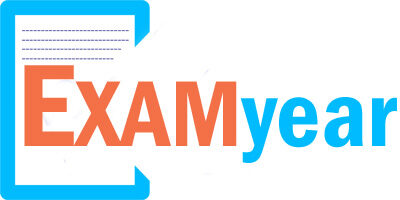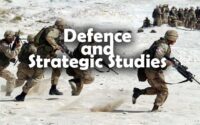Defence and Strategic Studies Sample Question
1. Who among the following stated that “If you tell a lie big enough and keep repeating it, people will eventually come to believe it”?
(A) Gobbles
(B) John Foster Dulles
(C) Andrew Gramico
(D) Anthony Eden
2. Which of the following North-East states of India was first to face the brow-brunt of ethnic insurgency?
(A) Assam
(B) Nagaland
(C) Manipur
(D) Tripura
3. When did the UN General Assembly adopted the Arms Trade Treaty (ATT) on conventional arms?
(A) 2015
(B) 2013
(C) 2011
(D) 2006
4. The Armed Forces Special Powers Act was enacted in Jammu and Kashmir in the year:
(A) 1985
(B) 1987
(C) 1990
(D) 1992
5. A war, which involves many participants, multiple major powers to conquer and occupy enemy territory. Decision makers utilize all available weapons of warfare and target both civilian and military sites. What kind of war is this?
(A) Civil War
(B) Asymmetric War
(C) Limited War
(D) General War
6. Identify the correct code for the Assertion (A) and Reason (R) as given below:
Assertion (A): “Power flows from the barrel of a gun.”
Reason (R): Dictum gained popularity due to its pithiness and vivid imagery, rather than any profoundity
Codes:
(A) Both (A) and (R) are not correct
(B) Both (A) and (R) are correct
(C) (A) is not correct, (R) is the logical explanation of (A)
(D) (A) is correct, (R) is not the logical explanation of (A)
7. Who amongst the following propounded the concept of structural violence?
(A) A.G. Frank
(B) Kofi Annan
(C) Johan Galtung
(D) Barry Buzan
8. The concept of Confidence Building measures germinated from which one of the following?
(A) Conference on Security and Cooperation in Europe in 1975
(B) Canberra Commission
(C) Atlantic Charter
(D) Brundtland Commission
9. Chabahar port is located in:
(A) Iraq
(B) Iran
(C) Afghanistan
(D) Papua New Guinea
10. Who emphasised that “Pakistan, Afghanistan and Central Asia constitute a single region”?
(A) Shuja Pasha
(B) Wajahat Hussain
(C) Ahmad Rashid
(D) Maleeha Zodi
11. Which year the Nuclear Weapon Free Zone Treaty in South-East Asia was opened for signature?
(A) 1995
(B) 1996
(C) 1985
(D) 1967
12. SAARC was established in the year:
(A) 1980
(B) 1985
(C) 1990
(D) 1995
13. The theory of nuclear deterrence is useful because:
(A) Helps to avoid war between states
(B) Helps to establish peace between states
(C) Helps to increase economic co-operation between states
(D) Helps to improve standard of living
14. Gorbachev adopted dual policies in order to make Soviet Union stable through openness and radical restructuring in the context of:
(A) Perestroika
(B) Glasnost
(C) Shock therapy
(D) Both (A) and (B)
15. Confidence Building Measures (CBM) were first conceptualised in the wake of which of the following conflicts?
(A) India-Pakistan War of 1965
(B) Sino-Indian Conflict of 1962
(C) Vietnam War
(D) Cold War
16. The following countries were not the original members of the Association of South-East Asian Nations:
(A) Indonesia, Malaysia
(B) Philippines, Singapore
(C) Vietnam and Laos
(D) Singapore, Indonesia
17. Who among the following is the author of the book, “The Clash of Civilization and the re-making of World Order”?
(A) Francis Fukuyama
(B) Joseph Frankel
(C) Samuel P. Huntington
(D) K. Booth
18. The following is an external determinant of the Defence Budget:
(A) National Interest
(B) Threat Perception
(C) Commitment of Ideology
(D) Technological Capability
19. Collective Security System is:
(A) Techniques of presentation of Peace
(B) Strategy of National Security
(C) Technique of Balance of Power
(D) Part of Diplomacy
20. Choose one of the following countries which is not part of G-4 Nations who are contesting for permanent seat in the United Nations Security Council:
(A) Germany
(B) Japan
(C) India
(D) Mexico
| GK | Previous Papers |
| Practice Question | Quiz |
| Mock Test | Objective Papers |
| Old Question | MCQs |
| Sample Papers | UGC NET Solved Papers |
| Model Question |
21. The Cuban Missile Crisis is the best example of:
(A) Brinkmanship
(B) Limited War
(C) Guerilla War
(D) Insurgency
22. The role of Britain has declined in South Asia ever since it moved from the east of Suez in:
(A) 1970
(B) 1971
(C) 1972
(D) 1973
23. Which one of the following is not correct in respect of collective security theory?
(A) The aggressor is always right
(B) Aggressor must be stopped
(C) Wars are prevented by restraint of military action
(D) The aggressor is easily identified
24. The first woman who presided over the UN General Assembly Session was:
(A) Ellonor Roosevelt
(B) Ms. Angle E. Brooks
(C) Smt. Vijaya Laxmi Pandit
(D) Margaret Alwa
25. Transfer of Military Technology affects:
(A) Transfer of arms strategy
(B) Weapon technology and national security
(C) Technology and arms trade
(D) Technological know-how and arms buildup
26. TRIMS relates to which of the following issues?
(A) Trade
(B) Telecom
(C) Investment
(D) Monetary
27. Identify the correct code for the Assertion (A) and Reason (R) as given below:
Assertion (A): States share a common interest in peace.
Reason (R): Any state that disturbs peace is both irrational and immoral.
Codes:
(A) Both (A) and (R) are not correct
(B) (A) is correct, but (R) is not correct
(C) (A) is not correct, but (R) is correct
(D) Both (A) and (R) are correct
28. Identify the correct code for the Assertion (A) and Reason (R) as given below:
Assertion (A): Nuclear fusion is used to generate electricity.
Reason (R): Nuclear power is not used because it cannot be controlled.
Codes:
(A) Both (A) and (R) are correct
(B) Both (A) and (R) are not correct
(C) (A) is correct, (R) is not correct
(D) (A) is not correct, (R) is correct
29. Which one country is not a member of NAFTA?
(A) Cuba
(B) Canada
(C) Mexico
(D) USA
30. Who among the following distinguished between ‘industrial’ and ‘militant’ societies?
(A) E. Durkheim
(B) Karl Marx
(C) Herbert Spencer
(D) Saint Simon
31. The Architect of India’s Nuclear Programme was:
(A) Vikram Sarabhai Patel
(B) Dr. Homi Jahangir Bhabha
(C) Dr. A.P.J. Kalam
(D) C.N.R. Rao
32. Which of the following is not the determinant of Defence Expenditure?
(A) Economic Condition
(B) Geography of the country
(C) Relations with Neighbours
(D) Non-Cooperation by Opposition
33. Globalisation resulted in:
(A) Financial Integration
(B) Monetary Union
(C) Global Free Trade
(D) Economic Interdependence
34. ‘Inflation’ is a phenomenon which is associated with:
(A) Increase in money circulation
(B) Decrease in money circulation
(C) Negative Balance of Payment Situation
(D) Price rise
35. Which among the following is an intangible component of national power?
(A) Territory
(B) Military capability
(C) Industrial capability
(D) National morale
36. Who presented Rimland theory?
(A) Halford John Mackinder
(B) Nichols Spyman
(C) Hans J. Morganthau
(D) Alfred T. Mahan
37. Who defined “War is thus an act of force to compel our enemy to do our will”?
(A) Kautilya
(B) Sun-Tzu
(C) Alfred T. Mahan
(D) Karl Von Clausewitz
38. Kargil Enquiry Committee of Govt. of India was chaired by:
(A) Gen. K. Sunderji
(B) Air Commodore (Retd) Jasjit Singh
(C) K. Subramanyam
(D) General Manekshaw
39. Balance of Power has been transformed into Balance of Terror due to the advent of:
(A) Biological Weapons
(B) Chemical Weapons
(C) Nuclear Weapons
(D) Weather weapons
40. At present national security advisor to Prime Minister of India is:
(A) Ajit Doval
(B) M.K. Narayanan
(C) Brijesh Mishra
(D) Lt. Gen. G.D. Bakshi
41. What differentiates a ‘State’ from a ‘Nation’?
(A) Territory and people
(B) Government
(C) Sovereignty
(D) Consciousness of political unity
42. Credibility is the governing and deciding factor in “theory of deterrence”. Thus, credibility is maintained by two subfactors namely:
(A) Rationality and an option
(B) Capability and killing instinct
(C) Communication and rationality
(D) Rationality and civil-defence
43. Who suggested the following formula/equation which does not necessarily permit exact measurement?
Pp=(C+E+M) X (S+W),
(A) Ray S. Cline
(B) Barry Hughes
(C) Clifford
(D) General K. Sunderji
44. Functional commands in Indian Air Force are:
(A) 7
(B) 6
(C) 2
(D) 4
45. The concept of ‘Limited War’ does not mean:
(A) A war Whose objective is of smaller scope than total defeat of the enemy
(B) A War against the military people and establishments
(C) A War conducted with deliberately restricted aims and resources
(D) An armed conflict start of general War
46. In 1951, a peace treaty was signed between the Allied powers and Japan at San Francisco. As per the treaty, Japan had to recognize the independence of …………………… ..
(A) China
(B) Korea
(C) Mongolia
(D) Philippines
47. The duration of operation ‘POLO’ was
(A) From 13th September to 18th September 1948
(B) From 17th January to 18th February 1948
(C) From 27th September to 13th November 1948
(D) From 3rd September to 8th September 1948
48. Who among the following thinkers/scholars Wrote the book, “The Conduct of War”?
(A) Quincy Wright
(B) Karl Von Clausewitz
(C) Major Gen. J.F.C. Fuller
(D) Liddle Hart
49. Cross Border Terrorism by Pakistan is the result of:
(A) Operation Topaq
(B) Operation Gibraltar
(C) Operation Al-Badar
(D) Operation Zerb-e-Momin
50. Which one of the following code name has been given to the Indo-French Naval Exercise held in 2002, at the coast of Goa?
(A) Indra II
(B) Hope II
(C) Varune II
(D) Viiav II

